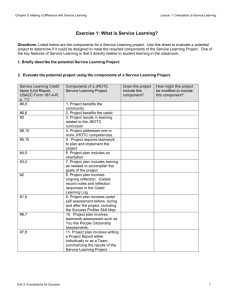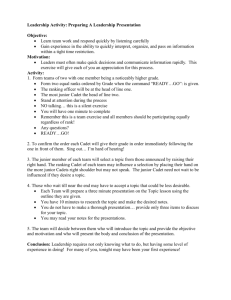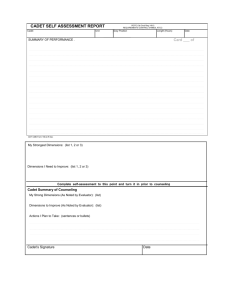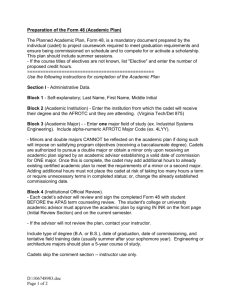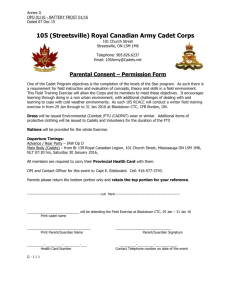Chapter 4 - Annex A Cadets First
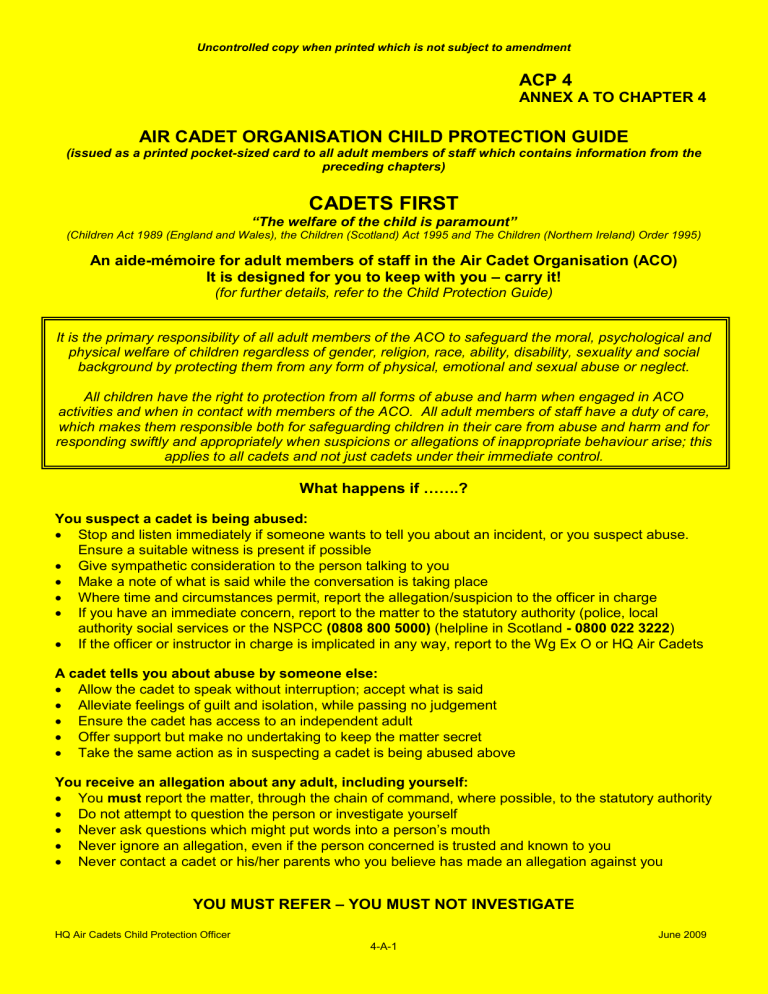
Uncontrolled copy when printed which is not subject to amendment
ACP 4
ANNEX A TO CHAPTER 4
AIR CADET ORGANISATION CHILD PROTECTION GUIDE
(issued as a printed pocket-sized card to all adult members of staff which contains information from the preceding chapters)
CADETS FIRST
“The welfare of the child is paramount”
(Children Act 1989 (England and Wales), the Children (Scotland) Act 1995 and The Children (Northern Ireland) Order 1995)
An aidemémoire for adult members of staff in the Air Cadet Organisation (ACO)
It is designed for you to keep with you – carry it!
(for further details, refer to the Child Protection Guide)
It is the primary responsibility of all adult members of the ACO to safeguard the moral, psychological and physical welfare of children regardless of gender, religion, race, ability, disability, sexuality and social background by protecting them from any form of physical, emotional and sexual abuse or neglect.
All children have the right to protection from all forms of abuse and harm when engaged in ACO activities and when in contact with members of the ACO. All adult members of staff have a duty of care, which makes them responsible both for safeguarding children in their care from abuse and harm and for responding swiftly and appropriately when suspicions or allegations of inappropriate behaviour arise; this applies to all cadets and not just cadets under their immediate control.
What happens if …….?
You suspect a cadet is being abused:
Stop and listen immediately if someone wants to tell you about an incident, or you suspect abuse.
Ensure a suitable witness is present if possible
Give sympathetic consideration to the person talking to you
Make a note of what is said while the conversation is taking place
Where time and circumstances permit, report the allegation/suspicion to the officer in charge
If you have an immediate concern, report to the matter to the statutory authority (police, local authority social services or the NSPCC (0808 800 5000) (helpline in Scotland - 0800 022 3222 )
If the officer or instructor in charge is implicated in any way, report to the Wg Ex O or HQ Air Cadets
A cadet tells you about abuse by someone else:
Allow the cadet to speak without interruption; accept what is said
Alleviate feelings of guilt and isolation, while passing no judgement
Ensure the cadet has access to an independent adult
Offer support but make no undertaking to keep the matter secret
Take the same action as in suspecting a cadet is being abused above
You receive an allegation about any adult, including yourself:
You must report the matter, through the chain of command, where possible, to the statutory authority
Do not attempt to question the person or investigate yourself
Never ask questions which might put words into a person’s mouth
Never ignore an allegation, even if the person concerned is trusted and known to you
Never contact a cadet or his/her parents who you believe has made an allegation against you
YOU MUST REFER – YOU MUST NOT INVESTIGATE
HQ Air Cadets Child Protection Officer June 2009
4-A-1
Question
What should I do if a cadet asks to speak to me in confidence about what could be a child protection matter?
Who is responsible for reporting concerns to the appropriate authorities?
What do I do if I think a child is in immediate danger?
Should I contact parents/guardians/carers?
What should I do if I hear allegations/have suspicions/get a report about potential abuse, and members of the ACO are implicated?
How many people should be informed?
Uncontrolled copy when printed which is not subject to amendment
What To Do
Arrange for a third person (who is acceptable both to you and the cadet) to be present and make sure you are out of hearing and sight of others.
Reassure them and listen carefully to what they are saying – do not ask questions . Make no judgement about what you’ve heard and stay calm.
YOU ARE . However, where time and circumstances allow (which normally should be the case), the matter is to be discussed with your CO or other superior officer.
In urgent cases, where you have an immediate concern about the welfare of a child who may be at risk , you must make direct contact with the one of the statutory authorities (social services, the police or the
NSPCC (see contact details below)), reporting later to your chain of command.
The parents or guardians/carers of the cadet subject of the disclosure or allegation should normally be informed by the Sqn CO as soon as possible that a report is being made to the police or social services
In cases where you hear allegations about yourself or your colleagues, or hold suspicions or concerns in which your colleagues are implicated, you should consult your superior officer without delay. If your superior officer is implicated in any allegations or suspicions you should immediately consult your Wg Ex O.
Only discuss child protection issues with the individuals mentioned in the
Child Protection Guide.
ACP 4 ANNEX A TO CHAPTER 4
Key Points
You cannot keep what they tell you a secret, but reassure them that anything they tell you will remain “in confidence”.
Ensure you write down times, facts, observations (verbatim speech if possible).
Talk to your CO and/or Wg Ex O (if applicable) who will normally consult with HQ Air Cadets (Personnel Staff Officer or Child Protection Officer).
Have the cadet’s name and address and the name and address of their parent/guardian/carer available. Refer to your notes – don’t filter or withhold any information. You have no right to detain a cadet but you should provide a “place of safety”, if possible, until the authority assumes responsibility.
If parents or guardians/carers are implicated, do not inform them but request advice from the statutory authority.
The Wg Ex O will ensure that the chain of command (including
HQ Air Cadets) is informed.
For reasons of confidentiality, the number of people to be informed of alleged child abuse cases reported to the authorities are to be kept to a minimum ( ‘need to know’).
Local Information
Wing Executive Officer
Telephone Number
Local Authority Social
Services
Telephone Number http://www.direct.gov.uk/en/Dl1/Directories/DG_10011509
HQ Air Cadets
(Child Protection Officer)
HQ Air Cadets
(Personnel Staff Officer)
01400-267088
01400-267638 or 267639
Child Protection Helplines
Police (local number)
(or 999 in any emergency)
NSPCC - 0808 800 5000 Scotland - 0800 022 3222
http://www.nspcc.org.uk/helpandadvice/NSPCCHelpline/NSPCCHelplines_wda59025.html
Contacting Social Services or the Police: ask for the Duty Officer (or Emergency Duty Team) and say that you wish to discuss a child protection matter:
ask for the name of the person with whom you are speaking
discuss all the information you have (nothing is to be filtered or withheld)
state your intention to advise your chain of command
ask if anyone else should be informed
keep a record of your conversation and of any advice given
REMEMBER:
-- never do nothing
-- don’t assume someone else will do something
-- never push a child for more information
-- never discuss your worries with the suspected abuser
4-A-2

